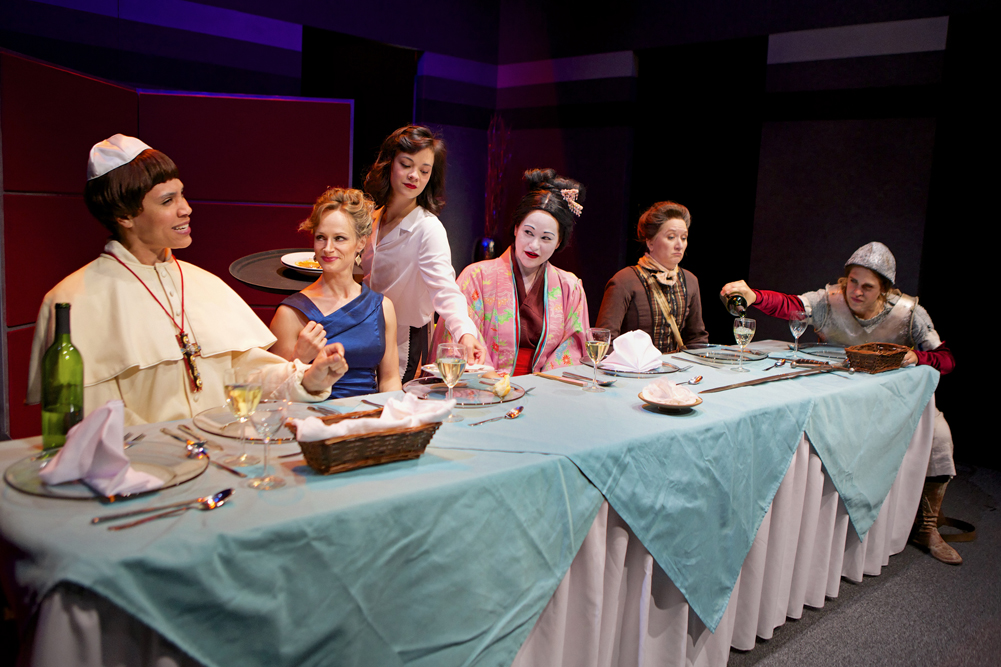
The Pope (Leontyne Mbele-Mbong) gets a word in at a busy dinner table in “Top Girls,” at the Ashby Stage in Berkeley through August 2.
“‘Top Girls’ begins with a dream — a fantasy of women from the past — and ends with a nightmare — a young girl’s vision of the future,” says director Delia MacDougall. That’s good to know going in, as the play opens with a dinner party at which each guest appears to have leapt through time from centuries before, while the one that follows is glaringly realistic, set in a modern business office. Awareness of that framework upfront would help an observer to follow the play’s unconventional structure as the story unfolds. “As a playwright she (Caryl Churchill) is interested in breaking the linear pattern of plot,” MacDougall explains.
Knowing something beforehand about the famous personalities at the “dream” dining table would also enhance a viewer’s enjoyment of the play. Dull Gret, for example, is a figure from a 16th century painting in which a brutish woman leads a charge into hell, she and her followers smiting demons as they gather treasure in their aprons. Rosie Hallet portrays the warrior figure as well as Marlene’s present-day niece Angie, a tall and awkward young woman sorely lacking in social graces.
Pope Joan is another semi-mythical character at the opening scene’s VIP table. The female pontiff from Middle Age lore is said to have successfully feigned masculinity until one day during a grand procession, when she dismounted from her horse and proceeded to give birth on the street. Leontyne Mbele-Mbong plays Joan and modern-day office worker Nell with terrific power and wit.
The play can get annoying the way it leaps around in time and context, but it is packed with thought-provoking action and ideas. Each woman’s sense of identity — her unique bundle of hopes, fears and expectations — is depicted in the context of her surrounding social and political climate, and even beyond that, reflecting the world histories that birthed those defining cultures.
Marlene’s transformation lies at the heart of the story, and it is interesting to watch her expose and contemplate the aspects of her self that were previously hidden from view. She is startled to find her niece appear unexpectedly at her office one day but seems ready enough to accept the inconvenience and even follow it through to whatever it may bring. She may be holding a lot inside, but Marlene is surprisingly willing to allow it all to come out and bear scrutiny.
I found that I had never before given so much thought to “women’s issues” as I did during this play. I definitely learned something about the subject and of course myself, being a member of that half of humanity. However, I personally have a fairly strong preference for examining any subject from at least one positive angle, and I found “Top Girls” to be entirely critical of a woman’s lot in life. I found myself wanting that part to arise, waiting for the comedy, the love, the hope, or at least a direction that led to some fruitful possibilities.
Don’t get me wrong — the play is not entirely pessimistic. It is informative and intelligent and truthful. I am glad I had the opportunity to see it, and I feel confident to recommend it, certain that almost anyone would find it enjoyable and thought-provoking.
Director Delia MacDougall brings “Top Girls” to life with charm and wit. It’s easy to imagine that playwright Churchill would approve. The play drags a bit in the opening scene, with so many diverse historical figures vying for attention at the communal table, but their words set an important foundation from which the story springs. Go armed with a bit of background information, and be prepared to enjoy a fine work of theatrical art.˚
If You Go
“Top Girls” continues at the Ashby Stage, 1901 Ashby Ave., Berkeley through Aug. 2. Tickets are $20 to $30 and are available by calling 510-841-6500 or online at shotgunplayers.org.
Elizabeth Warnimont is a freelance writer specializing in the performing arts. She holds a bachelor’s degree in literature from the University of California-Santa Barbara.





